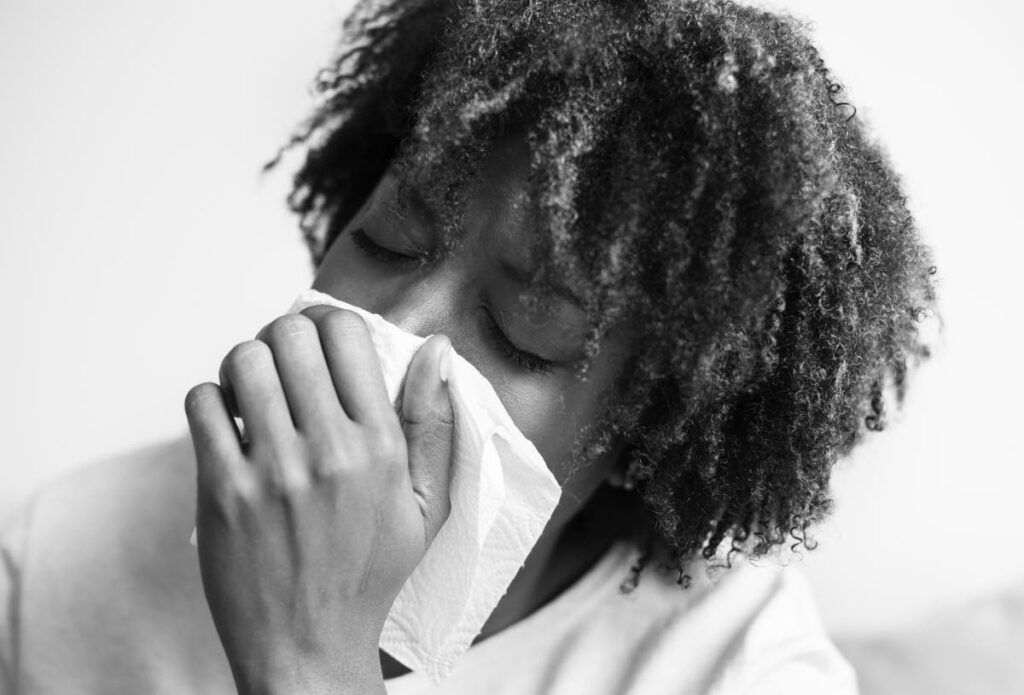Carnival vigilance: Tackling flu season with confidence

BAVINA SOOKDEO
You’re all set for Carnival – but you have a tickle in your throat, or an annoying cough.
Before you know it, you’re down with the flu and you just don’t know what to do.
To shed light on the nuances of influenza and its convergence with the evolving covid19, Dr Visham Bhimull, a family practitioner, offers valuable advice.
In an interview with Newsday, Bhimull emphasised that the spread of influenza follows a well-defined pattern, dispelling the notion of randomness.
“The flu emerges in temperate regions during colder months and gradually extends its reach to tropical zones,” he said.
This predictable trajectory has significant implications for public health strategies, especially during the Carnival season.
Looking at the 2023-2024 flu season, Bhimull introduced the concept of a dynamic and ever-changing influenza virus.
“Understanding genetic mutations is crucial for developing targeted and effective preventive measures."
The virus's ability to evolve necessitates continuous research and adaptation of strategies to combat it effectively. He added that such mutations happen because of the interaction of humans with animals (and the rearing of animals and meat being part of our diets).
“The more we interact with animals and have that animal husbandry industry, the more we depend on it and the more we expand it, two things happen: because of the methane production, we contribute to global warming; because of the increased interaction between humans and animals, we will see more and more mutations occurring as we go on and we have seen it before with swine flu and covid19. The frequency of such things will increase if we don’t look at strategies to curb things or at least live a balanced life – eat less meat and more vegetables – things that would contribute to less interaction between humans and animals that drive this mutation process and increases the frequency of these pandemics we have been having over the past 30 years.”
Drawing attention to the parallels between covid and flu Bhimull pointed out, “Patterns of covid19 spread exhibit striking similarities to those of influenza.”
Environmental factors, human behaviour, and inherent characteristics contribute to these parallel trajectories, presenting challenges for public health management.
“Travel during flu season, especially during Carnival, increases influenza cases,” he cautioned.
Additionally, he noted the emergence of bronchitis as a complication of the current influenza, presenting long-lasting symptoms such as a chronic cough.
Bhimull advocates for a unified approach to preventive measures, emphasising that similar strategies for covid are applicable to influenza.
“Early detection and proper care can prevent complications; staying hydrated, resting, and maintaining a healthy diet are crucial," he advised.
These simple yet effective measures can significantly contribute to individual and community well-being.
Stressing the importance of immunity, Bhimull predicted, “Vaccination against both viruses may become a combined strategy in the coming years.”
This integrated approach could offer enhanced protection against evolving strains of both viruses.
As Carnival organisers prepare for festivities, Bhimull emphasised covid19 precautions. “Organisers should implement precautions, including mask-wearing, social distancing, and hand hygiene," he urged. “Staying home when sick is crucial to preventing the spread of both viruses during festive events, ensuring a safe and enjoyable celebration.”
Even post-Carnival, he advocates for continuing practices to mitigate the risk of infections. “Maintain hygiene practices post-Carnival: wash hands, wear masks, and keep a healthy lifestyle,” he recommended.
Additionally, he underscored the importance of building immunity through proper nutrition, exercise, and supplements like echinacea, zinc, and magnesium.
“Celebrating Carnival responsibly involves maintaining covid19 and influenza precautions.
“While festivities are integral to the Carnival experience, striking a balance with safety measures is crucial to preventing the risk of infections. Adopting a holistic approach to celebration ensures the well-being of individuals and the community at large.”
For information, Bhimull recommends referring to official sources such as the Ministry of Health’s website, broadcasts, the US Centers for Disease Control and Prevention and the World Health Organization.
“Informed decision-making based on accurate information is key to navigating the complexities of viral seasons.”
Precautions:
As Carnival enthusiasts gear up for the revelry, he reminded everyone to prioritise their well-being and follow these guidelines:
Avoid close contact with individuals displaying symptoms of illness.
When unwell, maintain a safe distance from others to prevent the spread of sickness.
If you're feeling under the weather, consider staying home. This precautionary measure helps to prevent transmitting your illness to others.
Use a tissue to cover your mouth and nose when coughing or sneezing.
Opt to wear a mask. This reduces the chances of spreading flu viruses through respiratory droplets.
Wash your hands regularly to protect yourself from germs. In the absence of soap and water, opt for an alcohol-based hand rub for effective hand sanitation.
Minimise the risk of germ transmission by refraining from touching your eyes, nose, or mouth. Germs can easily spread when contaminated hands come in contact with facial areas.
Clean and disinfect frequently touched surfaces, particularly during illness.
Ensure an adequate amount of sleep, engage in physical activity, manage stress levels, stay hydrated, and maintain a balanced diet for overall health.


Comments
"Carnival vigilance: Tackling flu season with confidence"